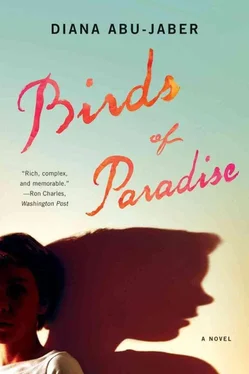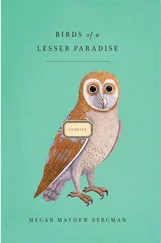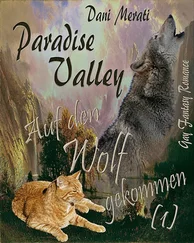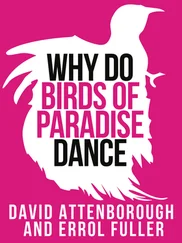He drives under a canopy of poinciana and spiky palmettos growing up along the highway, then passes a wreck taking up the right-hand lane, and finally the traffic begins to move. Brian muttering along with the music as if there’s nothing wrong at all.
FELICE AND EMERSON STRETCH OUT ON A BIT OF lawn in Flamingo Park by a stand of fragrant, inky trees, the night overhead tinted lilac by the city lights. First Emerson lies back, then he holds out his arms and she laughs but she lies down and rests her head on his chest, the fabric of his T-shirt warm and smelling of outdoors air. At first he holds as still as if she were a sparrow that’d miraculously lighted on him, only gradually relaxing. Felice thinks they will just lie there for a while, her hand riding the rise of his chest, listing to the chirp and creaking of geckos and the watery swish of cars. She remembers being six years old, sprawled in the stiff, sun-warmed grass — not quite asleep or awake — while Stanley picked the tiny strawberries in his garden. “Hey, hey, hey,” Emerson murmurs into her hair, soothing her. She hears the clip and snap and thump of people getting into their cars in the parking lot — off to the clubs. There’s a burst of French nearby, then some German from another direction. She doesn’t even notice when she hears Spanish. Her best friends Lola, Bella, Yeni all spoke Spanish at home. She feels, as she listens to the rush of air through his chest, that it’s been years since she’s experienced the luxury of falling asleep, instead of passing out from exhaustion or drinking or both. It has felt, for such a long time, as if there was always something to watch out for.
ON THE DAY FELICE ran away, she brought almost nothing with her: a cosmetics bag, a tube of her mother’s expensive sunscreen, a bottle of water, the sweater her brother had given her. Nothing to eat. It was cool and dry, an early March morning; still dark. Her parents had learned to watch her at night: they weren’t expecting her to get up early. She watched for police cruisers and stayed on the back streets, walking from the Gables through the chain-link Shenandoah neighborhoods, then crossed U.S. 1, weaving through lanes of stopped traffic, into Coconut Grove. There were so many roller bladers, baby carriages, and dog walkers on Bayshore, she risked strolling along the big thoroughfare, taking in the view of white Biscayne Bay. It took hours to walk and by the time she’d made her way into downtown, the morning commuters were clogging the narrow street and the air was ripe with exhaust. Felice was sweat-soaked before she was even halfway across the Venetian Causeway, but before her were plains of silvery water and the mirage horizon of high-rises. She had a feeling like struck sparks flitting through her body: anticipation and scraped-away dread and grief, and clear drops of joy.
Felice hadn’t wanted to move to the beach. But an older girl at a Gables party talked to her about it in a low, serious voice — you could so totally be a model. She’d heard it all her life; this girl had actually done it. She had a trapezoidal jaw and listless eyes: a strange ugly-beauty that made you stare. Felice had seen her on covers, her concave stomach and shoulders and peach-pit mouth. She said: Go do it, now, while you’re young. Felice was scared and crazy enough to think it would work — she would leave the thing behind in another time; she would be changed and lifted out of her life.
After she got to the beach, she napped in a wooden booth at the back of an Internet café, and that night Felice partied with the kids out on the sand. This became her regular practice — stealing naps in cafés, partying on the beach, along with spring-breakers, drunks, transvestites, homeless kids, bums, skate punks, illegals — everyone rooting through each other’s coolers, setting huge, illegal bonfires, trashing the beach grasses and dunes. Someone always had Quaaludes or Ecstasy, or tabs of acid, which she particularly enjoyed. She fell in with a group of tough, pretty Mexican girls who worked as chambermaids: they had hard brown arms and shoulders from bed-making and vacuuming. Sometimes they let Felice sleep in an empty room at night; but the air-conditioned spaces were so clean and silent she felt as if she didn’t sleep there so much as float, drifting on the slab of her body. Hilda, a tiny, dark girl, gave Felice her skateboard just before she moved to Orlando. Hilda said: Skateboarding is wearing wings — which Felice found was especially true when she was high. Felice and the girls used to drop acid together — the girls favored it mainly for the extra kick of speed. They dared each other to run through the sizzling edges of the bonfire. Once, Felice got to her feet and walked into the fire. The low flames rippled and bent around her feet like water, sealing up behind her. The beach rats faded beyond the scrim of heat. She dashed across the burning wood and the bottoms of her flip-flops melted. After that, the beach patrol started to crack down; they arrested the kids who were too strung out to run away — some had to spend two months in jail — and that was the end of bonfires for a while.
BACK THEN, SHE SLEPT outdoors all the time, legs cinched in a knot against her chest, like she’d dried up in that position, and one stiff breeze off the water would sweep her away. Felice saw outdoors kids everywhere. That’s what Reynaldo called them: “Like some pets are made for inside — little fluffy cats — but some you just gotta let run around outdoors.” Reynaldo’s dad kicked him out of the house. The police had their own name for kids like him— thrown-aways . Laughing, Reynaldo chanted his father’s words, bestia, perro, serpiente, maricón … “I called him a Colombian redneck. Asshole. He came after me with a machete. Lucky he was so fat — he couldn’t move fast enough to kill me.”
There were times she found herself about to confess to Reynaldo what had happened in school. But she believed silence might be part of the punishment — that telling would somehow lighten it. Anyway, the outdoor kids didn’t tell so much about where they came from — not unless they could make it a joke, like Reynaldo did.
Felice met Alma at one of the bonfire parties at the beach. Alma wanted to be a model and she said Felice could come live with her and they could be models together. It had seemed like a good plan. Alma lived with her mother in a tiny ground-floor apartment, so Felice slept in a battered recliner in the living room. Then the phone started ringing with modeling requests for Felice: Alma scowled and chewed at her nails while Felice chatted with booking agents.
Alma’s friend Bethany came around the apartment whenever she needed a shower or some food. Bethany was maybe fourteen years old: her face had a feral, foxy quality, her eyes full of glinting light, as if she could see in the dark. There was a thread of grime like a shadow along her jaw, her nails were lined with dirt. She talked about something she called her “baby” that Alma said was code for crack cocaine. Bethany ate candy mostly, clutched in her pointed, tiny hands, her face pinched in a nearsighted squint. She was pin-thin — the size of an eight-year-old — and had a stream of “clients.”
Felice couldn’t stand Bethany — her small teeth or her chatter. She couldn’t stand her furtive manner — the way her gaze roamed around, as if she were looking for something to steal. Lots of outdoor kids were like that: after a year on her own, Felice was also beginning to sense some of those qualities in herself. But Alma thought Bethany was “hilarious,” with her stories about seducible police, executives with fetishes, tourists with poisonous breath. There were her detailed, depressing dreams, and the way her voice sped up, clicking spit or stretched out like something unraveling, depending on the drug.
Читать дальше












